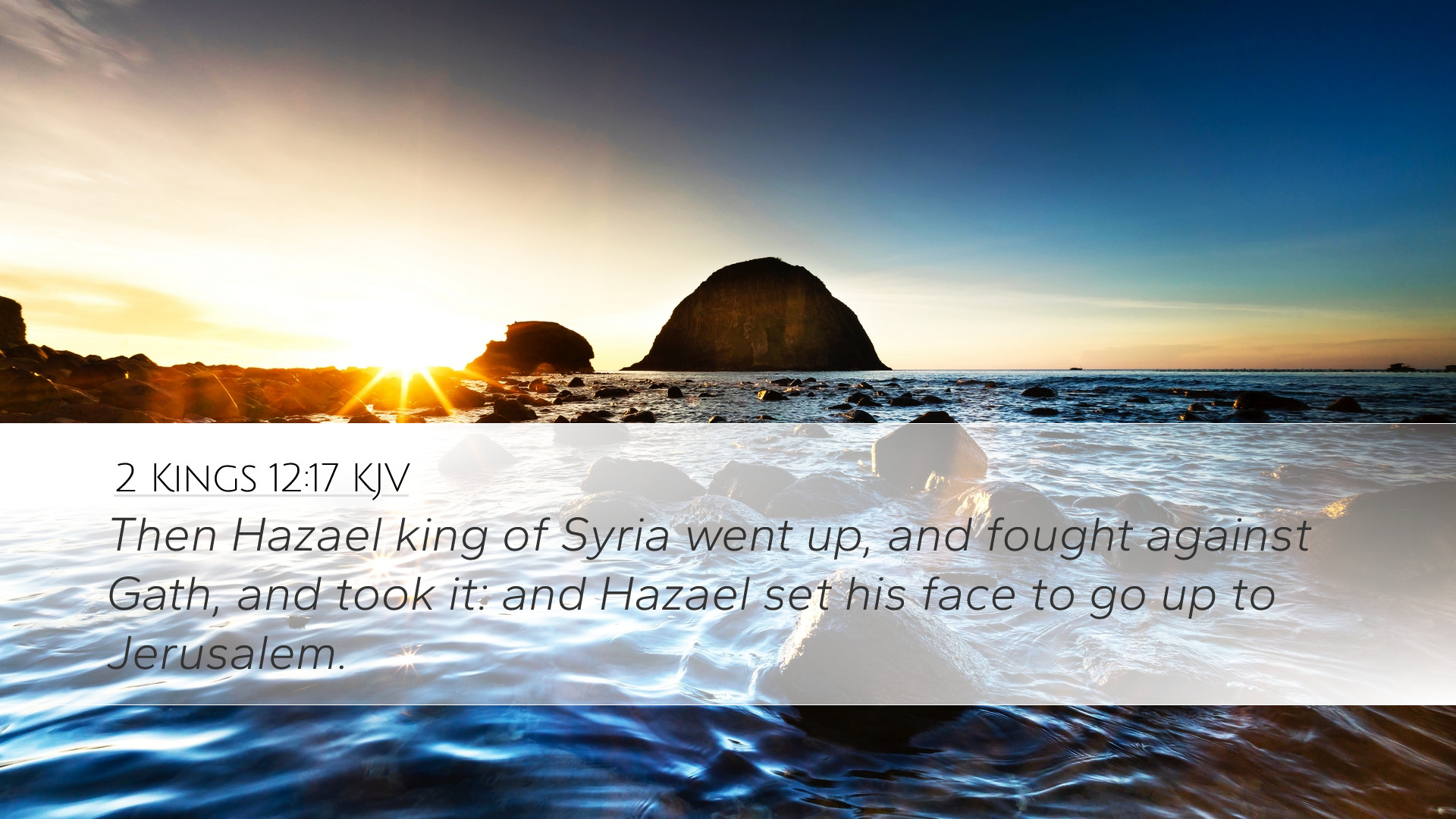Old Testament
Genesis Exodus Leviticus Numbers Deuteronomy Joshua Judges Ruth 1 Samuel 2 Samuel 1 Kings 2 Kings 1 Chronicles 2 Chronicles Ezra Nehemiah Esther Job Psalms Proverbs Ecclesiastes Song of Solomon Isaiah Jeremiah Lamentations Ezekiel Daniel Hosea Joel Amos Obadiah Jonah Micah Nahum Habakkuk Zephaniah Haggai Zechariah Malachi2 Kings 12:17
2 Kings 12:17 KJV
Then Hazael king of Syria went up, and fought against Gath, and took it: and Hazael set his face to go up to Jerusalem.
2 Kings 12:17 Bible Commentary
Commentary on 2 Kings 12:17
2 Kings 12:17 states: "Then Hazael king of Syria went up, and fought against Gath, and took it: and Hazael set his face to go up to Jerusalem." This verse marks a significant moment in the geopolitical landscape of Israel and Judah, highlighting the tensions and conflicts that plagued the region.
Historical Context
Understanding the historical background of this passage is crucial. Gath was a prominent city of the Philistines, and its capture by Hazael indicates not only the military prowess of Syria but also the decline of Israel’s influence. The narrative occurs during the reign of Joash (Jehoash), who was king of Judah, and it serves to illustrate the broader tensions between Judah and surrounding nations.
The Role of Hazael
Hazael emerges as a key player in this narrative. According to Matthew Henry, Hazael was an ambitious and ruthless leader characterized by his military strategies. His aggressiveness is seen as a fulfillment of God’s judgment against Israel due to their transgressions.
Albert Barnes amplifies this perspective, noting that Hazael's successful campaign against Gath set the stage for his subsequent invasion of Jerusalem. It was a clear signal of the changing power dynamics in the region, indicating the rising threat that Israel faced.
Theological Implications
This verse carries significant theological implications. It underscores the notion of divine sovereignty amid human actions and conflict. Adam Clarke notes that the rise of Hazael was allowed by God as part of His ultimate plan for Israel and Judah. The biblical narrative consistently reflects God's control over nations, even amidst human schemes.
The capture of Gath and Hazael's intentions towards Jerusalem should prompt reflection on divine judgment and mercy. As Hazael advances, the people of Judah are reminded of the consequences of their idolatry and disobedience.
Practical Application
For pastors and theologians, this passage offers profound lessons on leadership, accountability, and the reality of spiritual warfare. Just as Joash faced formidable political challenges, modern leaders face similar trials that test their faith and integrity.
- Faithfulness in Adversity: The example of Joash can inspire leaders to remain faithful, even when surrounded by external threats.
- Awareness of Spiritual Struggles: Understanding that physical conflicts often have spiritual dimensions encourages believers to seek God’s guidance.
- The Importance of Repentance: The spiritual state of Judah directly influenced their national security, suggesting a need for collective repentance.
Conclusion
In summary, 2 Kings 12:17 encapsulates a pivotal moment in the history of Judah. Through the lens of commentaries by Matthew Henry, Albert Barnes, and Adam Clarke, we gain insights into the historical, theological, and practical implications of this passage. As believers study this verse, they are called to understand the complexities of their faith in the midst of trials and to recognize the sovereignty of God over all circumstances.


